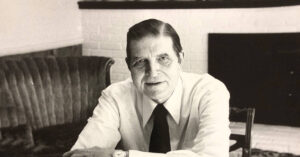
Packer’s Dusty Puritan Discovery Still Guides and Helps
May a new generation continue to follow Packer to make new discoveries like his of their own.

The End of Religious Liberty
Are we seeing the end of religious liberty? For Christians in America, we see the complexities of cultural engagement. Articulating the truths of biblical Christianity regarding sexuality and gender alone, brings conflict or worse. So, it is good and right to be concerned and wonder if the end of religious liberty is near. We also […]

The Purpose of Theology in Times of Uncertainty
For the first time in centuries, England had no King. What started with saber rattling led to a fractious civil war. After years of conflict during the 1640s, the anti-royalists terminated the war with a celebratory sabrage of the monarchy. Many declared the end of the world had come. For students at Oxford University, this […]

William Carey—A Plodder, Pioneer, and Proclaimer Who Kept the Grand End in View
Four years after having sent William Carey (1761-1834) to India, the Baptist Missionary Society sent John Fountain to aid Carey and send a report of what he found. Here’s part of his report, dated November 1796: [Carey] labours in the translation of the Scriptures, and has nearly finished the New Testament, being somewhere around the […]

Henry the Baptist Came Preaching: Henry and Baptist Political Theology
Was there anything distinctively Baptist about Henry’s political thought? The answer is yes, and it is focused on the first freedom: religious liberty. Carl F. H. Henry was a Baptist. That might seem like an unnecessary remark in a volume devoted to Baptist political theology, but with Henry it is a point worth making. During […]

On the third day He rose again — A Sonnet for Easter
In the mornings this year I’ve been re-reading a fourth century masterpiece. While Athanasius’s On the Incarnation is remarkable, it was C. S. Lewis who termed it a ‘masterpiece’ in his famous introduction to a new English translation of Athanasius’s work. As I read through the chapters of De Incarnatione Verbi Dei, I started summarizing each of the […]

Jason Duesing on Why Hope is Important for Our Current Cultural Context
FTC.co asks Jason Duesing, provost and professor of historical theology at Midwestern Seminary, “Why is hope important for our current cultural context?”

Jason Duesing on Adverbs in Theological Writing
In this video, FTC.co talked with Dr. Jason Duesing on the role of adverbs in theological writing.

In the Fog, There are Tidings of Comfort and Joy
Series: The Lord and Literature
Yet, though already reigning King, Jesus will come again to rule and reign in full. Into our world of darkness of fog, he will return and dwell with us and reign over us.

A Symphonious Approach to Missions
It is more helpful to think of the modern missions movement like other movements in church history and to minimize the emphasis on titles in favor of assessing all the component parts and their unique contributions that serve to make up the movement as a whole.

